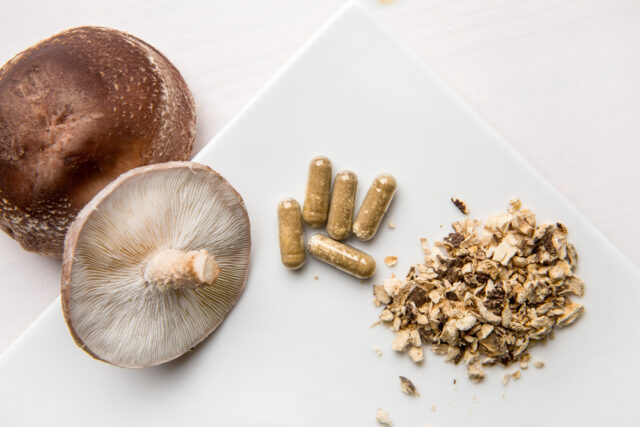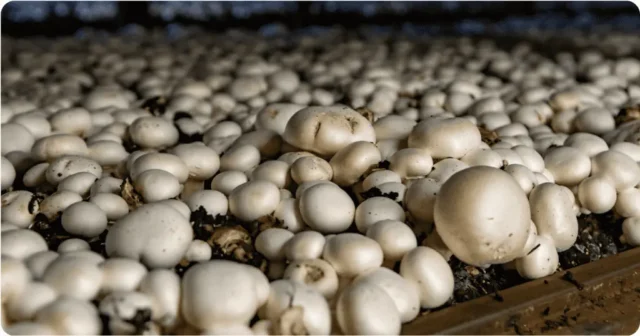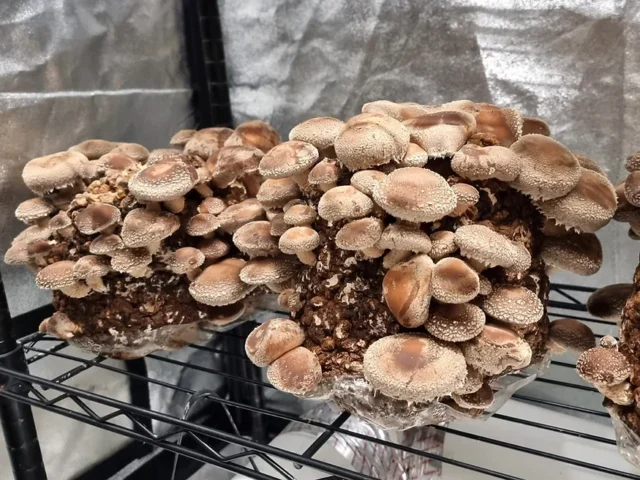
Are you looking for a unique approach to diversify your investments? Consider the thriving medical mushroom industry. These fungi, which have been used in traditional medicine for millennia, have significant health advantages supported by current science. In the next five years, the global market for these mushrooms is estimated to approach $50 billion.
An Introduction to Medicinal Mushrooms and Their Health Benefits

Medicinal mushrooms have been used in traditional Chinese medicine for centuries. Still, recent studies show these fungi may have untapped financial potential. Several varieties contain compounds that can boost immunity, fight inflammation, and may even have anti-cancer effects. As interest in natural remedies and preventative healthcare rises, cultivating these mushrooms is poised to become a lucrative business.
Reishi, shiitake, and oyster mushrooms are three of the most promising options for commercial growth. Reishi is revered as China’s “mushroom of immortality” for its potential anti-aging effects. Shiitake mushrooms contain lentinan, a compound thought to bolster the immune system. Oyster mushrooms are one of the most common culinary mushrooms. Still, they may also help lower cholesterol and contain anti-tumor agents.
The market for these medicinal mushrooms is substantial and growing. According to recent estimates, the global market will reach $50 billion by 2025. Dried reishi and cordyceps can range from $20 to $200 per pound, depending on quality and demand. Supplements and tinctures containing mushroom extracts sell for $30 to $100.
Starting a mushroom farm requires an initial investment, but it can be profitable with the proper cultivation techniques. Depending on the scale, an automated indoor growing system with humidity and temperature controls typically costs $50,000 to $200,000. However, a single 10” by 40” growing room can produce up to 3,000 pounds of mushrooms annually, generating over $100,000 in revenue.
Cultivating medicinal mushrooms may be a smart money-making endeavor for entrepreneurs interested in natural health. These mushrooms have promising health benefits, an established market, and, with the right techniques, can be grown on a large, commercial scale. Unearthing the profits of medicinal mushrooms could lead to a sustainable, rewarding business.
The Growing Demand for Medicinal Mushrooms and Mushroom Supplements

The market for medicinal mushrooms and mushroom-derived supplements has exploded in recent years according to Ediblealchemysd. As more people seek natural remedies for health conditions, medicinal mushrooms have become a popular alternative. According to Grand View Research, the global medicinal mushroom market is projected to reach $50.34 billion by 2025.
With such impressive growth and demand, cultivating medicinal mushrooms can be profitable. Many small mushroom farms and cooperatives have successfully sold freshly grown mushrooms to local restaurants, farmers’ markets, and CSAs. Larger operations are even exporting mushrooms and supplements around the world.
The two most popular medicinal mushrooms are reishi and cordyceps. Reishi mushrooms are prized for their immune-boosting and stress-relieving properties. Cordyceps are believed to improve athletic performance and fight fatigue. Supplements from these mushrooms, like capsules, tinctures, and powders, comprise much of the market.
Beyond reishi and cordyceps, many other medicinal mushrooms, such as lion’s mane, turkey tail, and oyster mushrooms, are worth exploring. Each mushroom has unique health benefits and can be cultivated and sold in various forms. The key is finding a niche and serving the customers interested in those mushrooms and products.
With some upfront investment, growing equipment, a solid business plan, and knowledge of mycology and mushroom cultivation, medicinal mushroom farming can provide a sustainable source of income. It’s an industry poised for even more growth, so for entrepreneurial farmers and business owners, the opportunity to unearth profits from medicinal mushrooms is now.
Startup Costs and Operational Expenses for Cultivating Medicinal Mushrooms

So, you want to get into the medicinal mushroom cultivation business. Great! Before you dive in, it’s important to understand the initial startup costs and ongoing expenses required to run a profitable operation.
Startup equipment
You’ll need basic equipment like a laminar flow hood, an autoclave, and culture media to get started. A laminar flow hood provides a sterile environment for inoculating mushroom cultures. An autoclave is used to sterilize substrates, tools, and other materials. Culture media, like potato dextrose agar, is used to grow mushroom mycelium. You’ll also need spawn, the mushroom mycelium, to inoculate your substrate. You can expect to invest $10,000 to $30,000 in initial equipment and materials.
Facility requirements
You’ll need a dedicated space for your operation, like a warehouse, barn, or commercial kitchen. Requirements include adequate ventilation, climate control, substrate preparation, and incubation space. Renting a suitable space can cost $1,000 to $3,000 per month.
Substrate and supplements
The substrate, like straw, sawdust, or grain, provides the food source for your mushrooms to colonize. You’ll also need supplements like gypsum, bran, and lime to adjust the pH. Substrates and supplements typically cost between $200 to $500 per 100-pound batch.
Labor
While the owner can manage small operations, larger farms require additional labor for substrate preparation, inoculation, incubation, and harvesting. Expect to pay farmhands $10 to $15 per hour.
Additional costs
Other ongoing costs include utilities, packaging materials, transportation, and maintenance. You’ll also need to invest in marketing to sell your products.
Starting a medicinal mushroom farm does require a substantial initial investment. However, with the increasing demand for functional mushrooms, the profit potential is high if you can achieve efficient production and build a loyal customer base. With patience and perseverance, you’ll be well on your way to unearthing a successful mushroom cultivation business.
Potential Revenue Streams From Selling Medicinal Mushrooms

Several potential revenue streams open once you have a steady supply of high-quality medicinal mushrooms. Selling directly to consumers is an obvious choice, but other options exist.
Selling to Supplement Companies
Many supplement and natural health companies are interested in sourcing high-quality, organic ingredients for their products. Medicinal mushrooms like reishi, cordyceps, and lion’s mane are popular supplements, so companies may be open to purchasing bulk mushrooms or mushroom extracts. This can provide a stable source of income, though the prices may be lower than selling directly.
Private Labeling
You can produce branded medicinal mushroom supplements, tinctures, and powders to sell to consumers. However, an easier entry point is to do private labeling for other brands. This means producing and packaging the products but using the brand’s label. The brand handles marketing and distribution while you focus on cultivation and production. Revenue potential depends on the specific deal with each brand.
Selling to Restaurants
Upscale restaurants, especially those focused on health-conscious and plant-based cuisine, may be interested in purchasing fresh or dried mushrooms to incorporate into dishes. Gourmet mushrooms like king oyster, shiitake, and oyster mushrooms are popular options. While revenue from each restaurant may be small, building a broad customer base can lead to solid, ongoing income.
Exporting
If you can produce medicinal mushrooms at a large scale and high quality, exporting to overseas markets like China, Japan, and parts of Europe may be feasible. Demand and prices for medicinal mushrooms tend to be higher in some Asian and European countries. However, exporting does require establishing relationships, meeting regulatory requirements, and ensuring proper storage and shipment of your products to maintain quality. Exporting can be complex but also very rewarding.
Cultivating medicinal mushrooms can be a financially viable business with multiple revenue streams, from selling to consumers, companies, and restaurants and exporting. The key is to start small, establish a high-quality and consistent supply, and build up your customer base over time through a diversified sales and marketing strategy.
Key Financial Considerations Before Starting a Medicinal Mushroom Farm

Starting a medicinal mushroom farm requires careful financial planning to ensure its viability and success. Here are some of the key considerations:
Cost of Production
The expenses involved in cultivating mushrooms can be quite high, especially when first getting started. You must invest in infrastructure like climate-controlled growing rooms, humidifiers, air filters, and shelving units. You’ll also need a reliable source for high-quality mushroom spawn and substrate materials. Calculate all costs thoroughly before moving forward.
Profit Margins
While the market for medicinal mushrooms is growing, profit margins can still be tight. Do extensive research on current mushroom prices to determine realistic figures you can expect for your harvest—factor in additional costs like packaging, marketing, and distribution to calculate your net profit margin. For small farms, diversifying into value-added mushroom products like tinctures, powders, and salves may help increase profits.
Certifications and Licensing
Obtaining the proper certifications and licenses is critical for selling mushrooms. Check with your local and state regulations regarding permits for cultivating and selling mushrooms. Certain certifications like USDA Organic or Kosher certification may allow you to charge premium prices. Make sure you understand all requirements and fees before applying.
Funding Sources
Starting a mushroom farm requires a sizable initial investment. Consider funding options like small business loans, crowdfunding, personal loans, or investor financing. Create a thorough business plan to present to potential funders, demonstrating a viable model for recouping costs and generating profits.
With careful planning and financial management, cultivating medicinal mushrooms can be a rewarding business venture. But go in with realistic expectations—it may take time to become profitable. Start small, keep costs low, build your customer base, and expand as sustainability allows. With dedication, you’ll be well on your way to unearthing profits from your mushroom farm.
Final Thought
So there you have it, folks. Medicinal mushrooms could be a lucrative new venture for any budding entrepreneur or small farmer looking to diversify their income streams. While the initial investment and learning curve may seem steep, the potential payoff down the line makes the effort worthwhile. Do your research, start small by experimenting with a few low-cost mushroom varieties, build up your expertise, and scale up as demand for your products grows. You could be at the forefront of an exciting new industry in a few years while making a tidy profit. The future of functional foods is fungi, so get in on the ground floor and start unearthing medicinal mushrooms’ profits.









